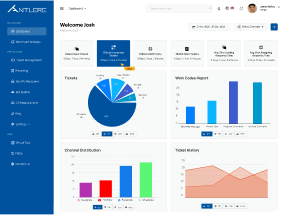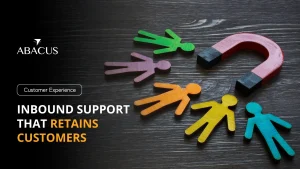Outbound vs Inbound Call Centers – What’s the Difference?
Although inbound and outbound call centers operate for different reasons entirely, combined, they are the backbone of efficient customer communication. One of them serves as a response to customer needs, while the other serves as the growth team for outreach and expansion. If you want to maximize your business strategy potential, you need to understand how these two types of call centers are different and the value each brings. What makes them different and how can they take your operations to the next level? Let’s break it down.
What Is a Call Center?
So, a call center or call center service is essentially a central spot where customer interactions happen over the phone or, more often these days, through chat, email, or SMS.
Call centers are typically divided into two categories:
- Inbound Call Centers – handle incoming calls from customers.
- Outbound Call Centers – make outgoing calls to customers or prospects.
All types serve a unique purpose in customer service, marketing, and sales execution. So what do they mean in more detail?

Inbound Call Centers: Meaning, Purpose & Use Cases
Inbound call center deals with the inbound calls which are made by the customers. Usually, these calls tend to be associated with customer service, questions about products, services, technical support, or inbound sales.
Key Features of Inbound Call Centers:
- Customer-initiated communication
- Focus on support, service, and satisfaction
- Agent performance measured by response time, resolution rate, and CSAT (customer satisfaction score)
Common Use Cases:
- Order tracking and returns
- Technical troubleshooting
- Inbound sales (e.g., a customer calling after seeing an ad)
- Appointment booking
- Billing support
Inbound call centers typically utilize inbound call center solutions such as IVR (Interactive Voice Response), CRMs, and call-routing systems to effectively manage high volumes of inbound calls.
Outbound Call Centers: Meaning, Purpose & Use Cases
Conversely, an outbound call center dials out to prospects or current customers. Most of these calls are related to sales/marketing, mean getting leads, or follow-ups or survey.
Key Features of Outbound Call Centers:
- Agent-initiated communication
- Focus on conversions, outreach, and prospecting
- Performance measured by call volume, conversion rate, and revenue generated

Common Use Cases:
- Cold calling and telemarketing
- Lead nurturing
- Appointment setting
- Market research surveys
- Debt collection
To increase efficiency, most outbound contact centers use predictive dialers, auto-dialers, and advanced scripting tools to maximize productivity.
Table: Inbound vs Outbound Call Centers at a Glance
Feature | Inbound Call Center | Outbound Call Center |
Call Direction | Customer → Business | Business → Customer |
Primary Objective | Customer support, inbound sales | Lead generation, telemarketing |
Typical Call Types | Inbound calls (queries, issues, support) | Outbound calls (sales, surveys, follow-ups) |
Key Technologies Used | IVR, CRM, call queuing | Auto-dialers, predictive dialers, scripting software |
Performance Metrics | Average Handle Time, CSAT, FCR | Conversion Rate, Calls Per Hour, Revenue |
Customer Interaction | Reactive – initiated by the customer | Proactive – initiated by the agent |
Compliance Requirements | GDPR, PCI-DSS (for sensitive info) | TCPA, DNC compliance (for sales outreach) |
Ideal For | Support-heavy businesses, service industries | Sales teams, B2B marketing, customer engagement teams |
What Is the Inbound and Outbound Meaning in Business Context?
Let’s break down the terminology:
- Inbound Meaning: Refers to anything coming into the business. In the case of call centers, it means calls initiated by customers.
- Outbound Meaning: Refers to actions going out from the business. In call centers, these are calls placed by agents to customers.
That distinction is more than about which way things are flowing, it relates to the objectives, methods and even tools that are a part of each communication type.
Inbound vs Outbound Call Center: Which One Do You Need?
Whether you need an inbound or outbound call center is based on your business model and what has priority at the moment.
Choose an Inbound Call Center if:
- You receive a high volume of customer support inquiries.
- You’re focused on customer experience and satisfaction.
- You need a team to handle inbound sales or manage service requests.
Choose an Outbound Call Center if:
- You’re running a lead generation or telemarketing campaign.
- You need to conduct surveys, appointment setting, or payment follow-ups.
- You want to proactively engage with customers to boost revenue.
Hybrid Call Centers: The Best of Both Worlds
Many modern businesses now operate hybrid call centers, combining both inbound contact center and outbound contact center functions.
Benefits of a Hybrid Model:
- End-to-end customer lifecycle management (from lead to support)
- Increased efficiency through centralized data and reporting
- Flexibility to shift focus based on business needs or seasonal trends

For example, a SaaS company can have inbound call center services to support users and an outbound calling team to upsell them a premium plan or bring back churned customers.
Business Impact: Why Understanding This Difference Matters
Understanding outbound vs inbound call center operations, will help you:
- Align your call center strategy with your sales funnel
- Choose the right BPO provider or call center services company
- Maximize ROI on customer engagement
- Stay compliant with global outreach and privacy regulations
Whether you’re outsourcing to a BPO services provider or building an internal team, having clarity on inbound vs outbound strategies is critical for efficient business process outsourcing management.
Quick Glossary of Related Terms
Term | Meaning |
Inbound Sales | Sales inquiries initiated by customers, often through inbound calls |
Outbound Call Meaning | A sales or follow-up call initiated by a business |
Inbound Call Meaning | A support or inquiry call made by a customer |
BPO Services | Business Process Outsourcing; includes call center functions |
BPO as a Service | Scalable outsourcing of business operations like inbound/outbound calls |
Front Office Outsourcing | Delegating customer-facing functions to a third party |
Types of BPO Services | Includes customer support, sales, HR, finance, and IT helpdesk |
Conclusion
Your Selection of Inbound or Outbound Call Center Services is not optional, but strategic
- If your business is based on continuous service to existing customers, then answering the question or resolving the issues through the inbound call center solution is probably your best bet.
- When your business growth, sales and outreach is your top priority, outbound call center will give you a chance to proactively reach out to your audience.
In these days, most of the organizations collaborate with the full-service BPO service providers to avail both inbound and outbound contact center services to deliver an exceptional customer journey.
Abacus Outsourcing offers end-to-end inbound and outbound call center services focused on customer experience enhancement, efficiency improvement, and scalability of business growth. Responsive support teams or proactive sales outreach, Scale with conviction and make a real impact where it matters experienced BPO solutions tailored to your need.
Struggling to choose your ideal call center solution, or to review business process outsourcing examples that suit your sector?
Contact us, and we can help you develop an affordable customer engagement strategy.










